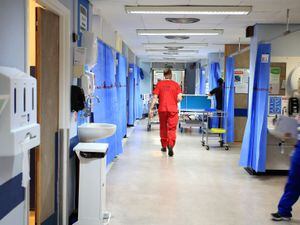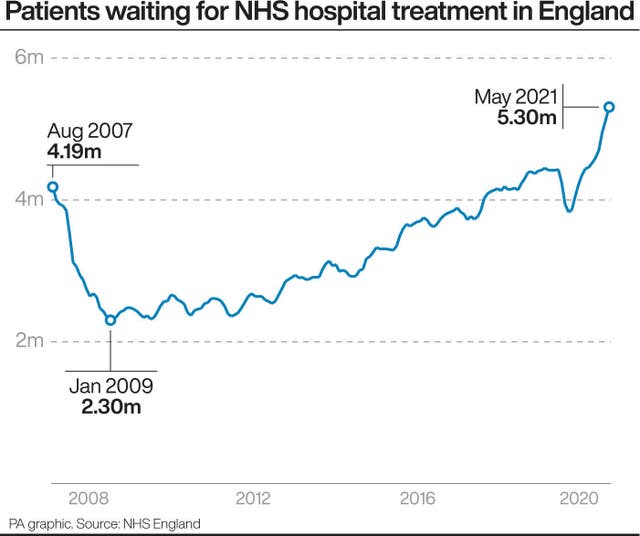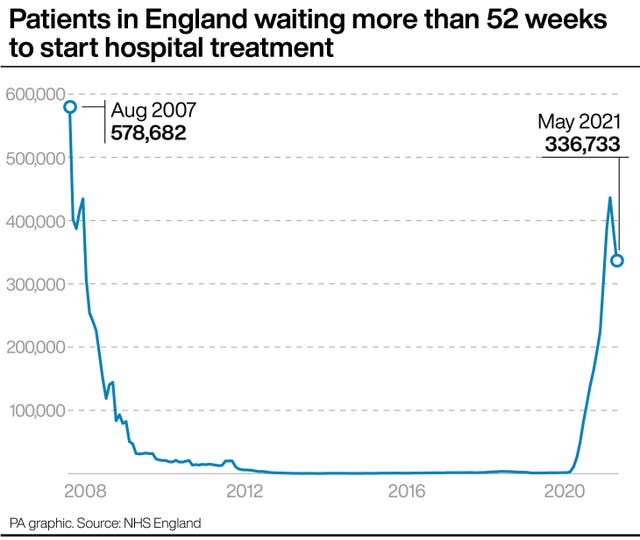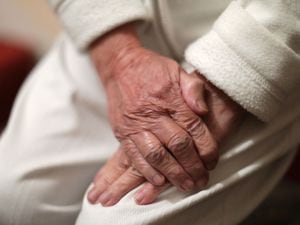NHS waiting list at record high but hospitals admitting more patients
The number of people waiting more than 18 weeks for treatment is down from 1.81 million in April to 1.73 million in May, a drop of nearly 83,000.

The number of people admitted to hospital for surgery and routine treatment is getting back to pre-pandemic levels, although the overall NHS waiting list has reached a new record high, figures show.
The total number of people admitted for routine treatment in hospitals in England in May was 242,064 – more than four times the number a year earlier (54,550), when hospitals were treating thousands of Covid patients.
Before the pandemic struck, the NHS admitted 295,881 people for routine treatment in May 2019, suggesting the health service is getting close to dealing with pre-pandemic numbers of patients.
However, the overall number of people in England waiting to start routine hospital treatment has risen to a new record high, the NHS England data shows.
A total of 5.3 million people were waiting to start treatment at the end of May 2021 – the highest number since records began in August 2007.
It comes after NHS Providers chief executive Chris Hopson said there are risks if England eases all coronavirus restrictions later this month.
He told BBC Radio 4’s Today programme: “We need to be realistic and we need to be open and honest about the fact that there are risks if we relax these restrictions and there will be consequences.
“The NHS won’t be able to do everything given the demand pressures it has got and the fact that we have got reduced capacity in terms of both beds and staff numbers.”

He said there will be “very significant” pressure on the NHS and “we will have to dial back on elective recovery”.
The data shows the NHS is currently making progress on long waits, with the number of people having to wait more than 52 weeks to start treatment standing at 336,733 in May 2021 – down almost 50,000 from 385,490 the previous month.
The figure is around 13 times the number waiting a year earlier, in May 2020, which was 26,029.
The number of people waiting more than 18 weeks for treatment is also down from 1.81 million in April to 1.73 million in May, a drop of nearly 83,000.
NHS medical director Professor Stephen Powis said: “Despite the huge disruption we have seen to care caused by the pandemic and the more than 405,000 Covid patients in our hospitals over the last 15 months, it is reassuring to see in today’s figures significant reductions in waits for routine operations, and for the first time this year, a reduction in the number of patients waiting more than 18 weeks for treatment.
“All the while, NHS staff have dealt with rising numbers of A&E attendances while continuing to rollout the NHS Covid vaccination programme and I would urge anyone who needs a routine operation to come forward, and anyone who needs urgent care to go to NHS 111 online or call 111 so that the best option for you can be determined.”
Responding to the high overall waiting list, Tracey Loftis, head of policy and public affairs at Versus Arthritis, said: “Thousands of people with arthritis are silently bearing the brunt of this crisis as they wait for life-changing hip and knee operations.
“Joint replacements are in the category of planned surgery and treatment that has been worst affected and slowest to restart over the last year, all too often considered not serious or life-altering enough to be front of the queue.”
Stella Vig, council member at the Royal College of Surgeons of England, said surgical hubs are needed across the country to treat the millions of people waiting for hospital treatment.
She said the data showed an increase in very long waits of more than two years for hospital treatment, with 3,927 patients in May.
“Behind the stats are patients waiting for planned surgery such as breast reconstruction surgery following a mastectomy, or a cochlear implant to improve their hearing,” she said.
“These types of procedures are life-changing. With the rest of the country looking forward to restrictions lifting on July 19, our patients have the right to expect a date in their diary for their operation.”
Shadow health secretary Jonathan Ashworth said: “More than five million people on the waiting list means record numbers waiting in pain or distress for treatment.
“We know that hospitals are already under extreme pressure this summer and as Covid cases continue to rise, this is only going to get worse.
“(Health Secretary) Sajid Javid has failed to put forward a plan to bring infections down, to clear the backlog or to support our NHS in this difficult period, instead he’s proposing a top-down reorganisation of our health service when it is under more pressure than ever before.”
The data also shows that nearly 300,000 patients in England had been waiting more than six weeks for a key diagnostic test in May.
A total of 297,471 patients were waiting for one of 15 standard tests, including an MRI scan, non-obstetric ultrasound or gastroscopy.
The equivalent number waiting for more than six weeks in May 2020 was 572,615.
Nuffield Trust chief executive Nigel Edwards said: “NHS staff are valiantly firefighting on multiple fronts.
“Exploding case numbers of the Delta variant are already leading to an uptick in hospitalisations, and non-Covid demand has rebounded significantly, with A&E units feeling the heat.

“This demand comes as staff work hard to make a dent in a growing and frightening backlog of care.”
He said staffing pressures, Covid measures and the seriousness of conditions may all be contributing to growing waits at A&E.
He added: “The total waiting list has now grown to a record 5.3 million people. This continued growth shows we are yet to reach the peak of pent up and put-off demand.”
Efforts to catch up on waiting lists “will be slowed” as Covid cases rise, Mr Edwards said, adding: “The situation is becoming ever more serious and I am very concerned about the impact this has on both patients and staff given the pressures they are under.”
Unison head of health Sara Gorton said: “These figures are a clear sign NHS staff will be under considerable pressure for months, if not years, to come.
“Despite the warm words from politicians recognising the exhaustion and burnout experienced across the NHS, health workers are not going to get the recuperation period desperately needed.
“All the more reason for the Prime Minister and new Health Secretary to give staff a morale-boosting pay rise, not the paltry 1% previously touted.”





